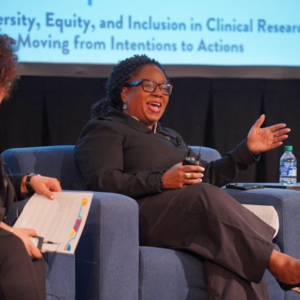Achieving a clinical research environment that is more diverse, equitable, and inclusive relies on all stakeholders deliberately moving from intention to action, attendees of the ACRP 2023 conference in Dallas, Texas, were told on Sunday morning (April 30).
During a panel discussion moderated by Audrey Cavenecia, Chief Experience Officer for Reveles Clinical Services, thought leaders in the realm of increasing representation of persons of all types among both the members of the clinical research profession and among the participants in the studies they produce shared their perspectives on the benefits to be gained from such efforts.
“I have to always be at the forefront of this conversation, because it’s personal to me,” said Quincy J. Birdsong, EdD, CIP, CCRP, Vice Provost for Health Affairs at Lipscomb University, recounting how his father became the first Black student to graduate from high school in his home county in an era when students of color were not allowed to study beyond 8th grade. However, even all these years later, “I don’t know that I’ve seen [inclusion] done well anywhere I’ve worked,” he added. “What we need to ‘include’ is excellence [in individuals], and that doesn’t have a race attached to it.”
Nadine Barrett, PhD, MA, MS, Assistant Professor of Family Medicine and Community Health at Duke University, said too many people think of diversity, equity, and inclusion (DEI) issues in terms of meeting quotas in hiring or patient recruitment, when they should be thinking of how populations of all sorts should be fairly represented in any setting. We should “recognize the inequalities [around us] and recognize they are hurting all of us,” she noted. “When we’re not seeing [the necessary progress in DEI around us], we need to know how, as an organization, to course change” with the appropriate methods and measurements in place to bolster progress, she urged.
Speaking from the perspective of a mother of two sons born blind, Kristin Smedley, Co-founder of the Thriving Blind Academy, encouraged the audience to think of DEI as a practice that is good for business in addition to being the right thing to do. “I want you to understand how much is possible when you start looking at [these issues] differently,” she said. “We have to change the stories we tell ourselves [about what DEI looks like in action]. It starts with people like you changing that story” of how we treat those who are different from us, she emphasized, and asking them “how can we help you be successful?”
Author: Gary Cramer



